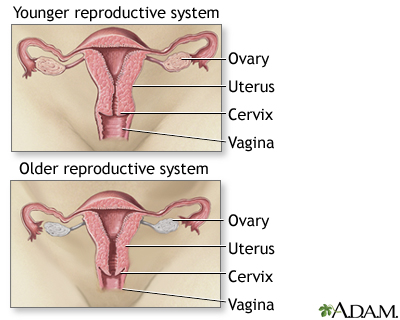
When a woman's menstrual period stops and hormonal changes begin, she is going through menopause. Symptoms, including hot flashes, can range from mild to severe.
The U.S. Department of Health and Human Services offers these suggestions to help alleviate menopausal symptoms:
- To help prevent hot flashes, avoid hot or spicy foods and beverages, stress and being in very warm places. Also, dress in layers.
- For vaginal dryness, try an over-the-counter vaginal moisturizer.
- To help you sleep, get plenty of exercise every day. Also avoid large meals, caffeine, alcohol, smoking or working in the hours before bed.
- To help mood swings, get plenty of regular sleep and exercise.
| Tags: Sexual Health, Women's Health |
Labels: Sexual Health, Stress, Women's Health
Post a Comment